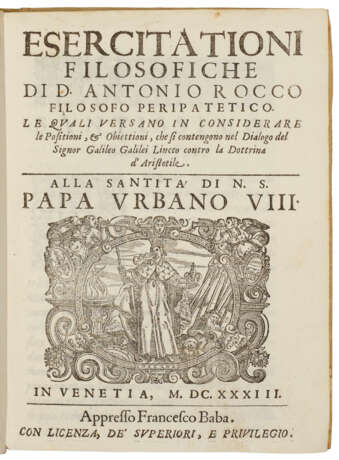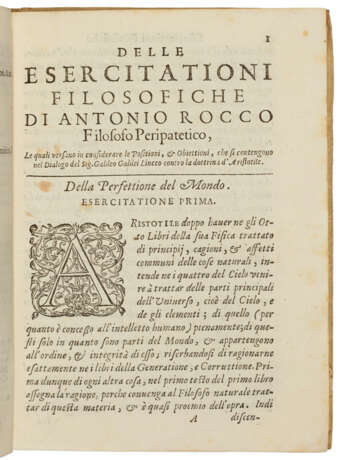ID 887851
Лот 78 | Esercitationi filosofiche
Оценочная стоимость
$ 6 000 – 8 000
Crisp, unpressed first edition of an important and rare critique of Galileo’s Dialogo, published within a year of the Dialogo. Much of Galileo’s Discorsi (1638) is a response to this work.
Rocco’s Esercitationi prompted Galileo to explain “how he detected and corrected the falsehood in Aristotle’s law of free fall” (Shea) and formulated his own law of falling bodies. Wallace, examining the reasons why the Aristotelians are accorded better treatment in the Discorsi, as compared to that in the Dialogo, remarks that ‘”a factor that is noteworthy was the publication of a book in late 1633 and dedicated to Pope Urban VIII that defended Aristotle’s teaching against the attacks made by Galileo in the Dialogo. The author of the work, entitled Esercitationi Filosofiche, was Antonio Rocco, and it is to Galileo’s credit that he read and annotated Rocco’s critique and even wrote out a series of replies to him, some of which later appeared in the ‘Two new sciences’ [Discorsi].” Also, “Micanzio suggested that Galileo consider Rocco’s book while writing his new treatise on motion. About the end of February Galileo sent to Micanzio seventy-five marginal notes on Rocco’s book, to which he later added some longer comments on separate sheets” (Drake). Stillman Drake and Wallace discuss at length, and Drake quotes from, these replies to Rocco, known as the postils to Rocco.
This work is especially interesting in the light of Pietro Redondi’s recent thesis that the condemnation of Galileo was motivated by his undermining of the tenets of peripatetic philosophy, and thus the philosophical edifice on which the Eucharistic mystery of transubstantiation was based. This was considered so threatening that the Jesuit scholars put on a “show trial,” with heliocentricity being Galileo’s alleged offence, in order to cover up the more serious Eucharistic crisis. Redondi describes Rocco as: “the most Peripatetic and least secular of these Aristotelian adversaries of Galileo - a libertine, a declared unbeliever despite his cloth, author of the most famous pornographic novel in seventeenth century Italy” (L'Alcibiade, fanciullo a scola).
Rocco’s text is arranged in eight sections. The first treats of general philosophical questions. The second is devoted to circular motion and velocity. The third is devoted to the composition of the heavens, the nature of matter, its form and substance, and the reality of substantial transmutation. The fourth is on the corruptibility of the heavens, comets, sunspots, novas, Galileo’s telescopic observations, etc. The fifth is on the moon and its relation to the earth. The sixth is on movement, and whether the earth moves or not. The seventh argues the immobility of the earth. The eighth is on various related topics, such as tides, etc. See Stillman Drake, Galileo at work, pp 359-67; Pietro Redondi, Galileo: Heretic; William Shea, Galileo’s Intellectual Revolution, pp 142-183; William Wallace, Galileo and his Sources, pp 312-4. Carli and Favaro 138; Riccardi I 386.
Quarto (195 x 141mm). Printer's device on title, 2 woodcut diagrams in text. Contemporary Italian vellum, title in manuscript on spine (chip to spine panel, a few stains).
| Адрес торгов |
CHRISTIE'S 8 King Street, St. James's SW1Y 6QT London Великобритания | |
|---|---|---|
| Предосмотр |
| |
| Телефон | +44 (0)20 7839 9060 | |
| Комиссия | see on Website | |
| Условия использования | Условия использования |





